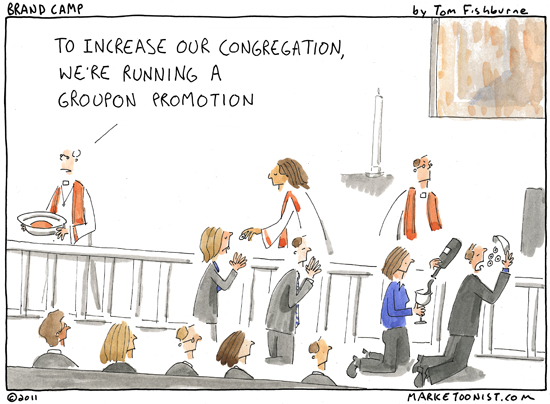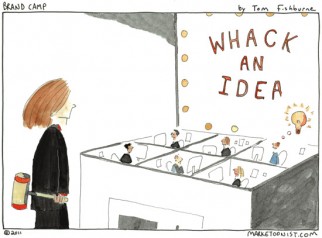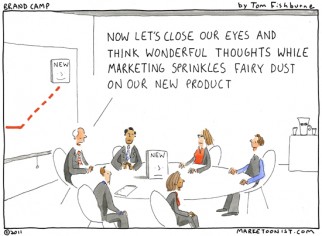Before running any marketing promotion, give some thought to who you’re attracting to your brand’s congregation. Are they the customers you want? Are they in it for the long haul?
These questions are particularly important with daily deal sites like Groupon, LivingSocial, and Google Offers. The sales windfall is tempting, but cautionary tales abound. One cafe owner recently described a Groupon promotion as “the single worst decision I have ever made“. Not only was it unprofitable and a bad fit for her business, it attracted mainly one-time deal hunters.
I learned that my last Groupon cartoon is now an appendix in the official Harvard Business School case on Groupon. Grouponomics is a hot topic. Yet deep discounting as a marketing strategy long predates Groupon. While 50-90% discounts are right for certain brands and business models, the daily deal mindset doesn’t drive loyalty. It trains customers to buy your brand on deal.
Rocky Agrawal shared the following insight in “Why I Want the Entire Daily Deals Business to Die“:
“For businesses, the notion that deep discounting is the way to acquire loyal customers is dangerous. Competing on price doesn’t get you love; delivering high quality products and services, engaging with your customers and creating unique experiences does. The best customers buy experiences, not price.”
Instead of rushing to “mark down”, think about how to “market up”. Create value rather than devalue. Instead of investing in a race to the bottom, invest in your brand’s experience.



Nic Hayes says
Depends on the Group Buying website. If you are talking about the bigger players that are only interested in getting “Whale Deals” that are described this way because the deal is so heavily over-subscribed without any regard to the business they are supposed to be supporting. Those deals are detrimental to the business, the consumer and ultimately the Group Buying concept.
I own a deal website and my merchants that I work with are number one. Their interests and requirements come first! This results in better deals for our subscribers and quality is returned to the table not quantity. Most of our merchants are coming back for second deals not because they feel they have to discount but instead use the opportunity to publicise their brand or product after what has been a very good experience already.
Price will get the customer through the door. Quality and service will have them coming back!
Deal2day is a Perth based website that is about to launch in Melbourne and Sydney. http://www.deal2day.com.au
G says
Very true and echoed by (the very sage) Drayton Bird ‘The fact is that if price is your only weapon there’s always someone ready to undercut you, even if they go broke doing it.’
Leadhead.com says
Doesn’t anyone remember the Entertainment Book? Did we not learn our lesson then? Same conundrum as Groupon just old school, analog style. The one benefit you get with online daily deals is that is does act as a mini awareness campaign. At least you get eyeballs seeing that your business exists. Point being, don’t give away the house with the deal you choose to put out there. Make sure that each deal sold makes profit. It’s worth it to sell less deals and just reap the benefits of the awareness being generated.
Steve Schildwachter says
Tom, this is a great post, and a timely one, as I’ll explain.
I’m quite involved in my church. It’s an important part of my life. I keep coming back to church because it helps me grow spiritually. Attendance is healthy, although some longtime members say “we used to have a lot more people.” People ask whether we should promote the church, as if a campaign would suddenly increase our congregation. (So far no one has suggested Groupon.)
My response is: Let’s focus on being the most faithful, most humble, and most Christlike church we can be. Yes, we can put notices on community bulletin boards, optimize the church website, etc. Our messages in those media, however, must reflect who we really are, and if we don’t know or don’t communicate that, the advertising falls flat. Worse, if someone visits us on Sunday morning and no one welcomes them warmly, we aren’t practicing what we preach.
The lesson for businesses is that we should never let the promise of big numbers — “lots of customers” — distract us from our brand promise. Most brands don’t stand for special discounts; those discounts are a tool. If we are true to what we are, or what we do best, the right customers will come — and stay.
http://twitter.com/SteveS1
TDLmarketing says
It’s true that Groupon attracts deal hunters in many cases, so I agree that it’s not a great way to attract loyal customers. I have many associates who “collect” groupons to all the restaurants in an area, so that on any given night they can have discounted food at a new place.
But that’s where differentiation becomes so important. You can’t just put a deal on Groupon and expect long-term value from those customers….unless your product/service is so well differentiated that you overcome the hurdle.
In short, don’t give customers a “free taste” unless you’re confident that your product provides value that matches the list price of your offering. Otherwise, you might never graduate consumers from “free taste” to “full price scoop”.
Beth Glassman says
Tom,
Sad but true story. My mom passed away last November and while at the funeral home, when we were going over prices, I inadvertantly blurted out, “Too bad I forgot my Groupon!” At least it broke the sadness for a bit. This cartoon, totally reminded me of that day.
Beth
Mike Morris says
As usual, Tom has portrayed an excellent insight into jumping onto the newest bandwagon. There is nothing inherently wrong with using coupons. They can be used to incent trial and reward loyalty. However, if you want folks to come back and pay full price, your product or service must be worth it to them. Additionlly, there seems to be a burgeoning culture of “the deal” in which the search for the deal is the reward, not the product or service. Watching these folks on Extreme Couponing load up on items they do not use simply because they can should cause marketers to think long and hard about how they use coupons, if at all.
SPM says
Groupon or not, consumers are increasingly looking for ways to buy on discount. Brands are in an interesting position when the number one reason consumers visit their site is to look for coupons (this is true at the CPG I work at). It seems to me like the rise of the deal mindset is a combination of our economy, novel options like groupon, and the ever-increasing pressure from retailers to subsidize our brands with trade spend. Just look at Walmart’s shift in strategy back to every day low prices. It’s a tough time to be a brand when theory tells us to build equity and our retailers are all about the pricing. Great cartoon, Tom, and loved the original Groupon one!
Kristine Emerick says
Another often forgotten impact of Groupon is the negative impact on the current customer base. I recently experienced this with my exercise studio. What I always liked about the experience was the limited class size with a lot of individual attention. When the Groupon hit, all the classes became so overcrowded that people had to be turned away. And if you did make it into the class, you were packed in without a lot of room to move. It definitely took away from what used to feel like a more exclusive, personal experience and caused a lot of negativity among the current client base that was paying a premium.
Copywriter Kevin Francis says
Tom,
Great cartoon, as always! What is there that the current fad Groupon cannot achieve, eh!
Excellent comments making good points. I’ll simply add that the big problem for most businesses is that they don’t have a good handle on the basics, with no clear, differentiated offer to prospects and no clear strategy to retain clients.
In those circumstances, price discounting is highly unlikely to offer any long term benefit. Used indiscriminately the likely outcome is simply training people to buy on price whenever there is a promotion.
On the other hand, if there’s a clear marketing sequence in place, then discounted offers may be a good way to generate leads. As always, testing and tracking will provide the answer.
Kristine makes a good point about the risk of alienating existing clients which is most likely to happen when discounts are used as a tactic, rather than as part of a coherent strategy.
Thanks again for a wonderful cartoon!
Kevin Francis
“www.MaximumResultsCopywriting.com”
tomfishburne says
Great dialogue all around, everyone, thanks! I absolutely agree that there’s a place for discounting as part of an overall marketing mix. However, it needs to be applied in measured doses as part of a broader strategy. The big picture is to create long-term profitable customers. Too often, the discount promotion itself becomes the end-all be-all. When I worked in British consumer products, the retail buyers only cared how many BOGO trade promotions you had in your plan. The other risk is that once you start deep discounting, it’s a slippery slope. Some Groupon offers are 90% off. I fail to see what value that discount depth brings to any brand unless they’re selling firesale liquidation inventory.
Early in my brand career, I drew this cartoon on Trade Deal Junkies: https://marketoonist.com/2003/01/trade-deal-junkies.html . One brand says in a support group: “I used to be premium-priced, on top of a growing category. Now I’m on deal every week! 2 for 1, 3 for 1, I just can’t stop!”
This week’s cartoon goes to Steve. I love the personal example with the church (that echoes the metaphor in my cartoon). Also this quote: “Most brands don’t stand for special discounts; those discounts are a tool”.
Richard says
As a consumer, the Group Buying schemes offer us superb value and choice. As a retailer, it affords us the opportunity to market to a whole new potential client base, at a fraction of the cost of old style media marketing. Once we have a buy-in of new clients, we need to ensure that our base product is already exceptional value, that our service is superior, that our staff are trained to upsell, and that we data-base this new client base so that we can do emarketing campaigns designed at ensuring we get repeat business from these clients. It is up to us to ensure that the money we spend on this marketing (some will say it is money we are losing from discounted sales, but it remains the cheapest form of marketing)is money well spent, and that we actually grow our business`s. I am both a consumer and a retailer, and these Group buying schemes work well for me in both scenario`s.
Rose says
Great cartoon and insights this week! I do subscribe to Groupon, but am probably an a-typical user in that I have not, so far, purchased any deals for companies that I do not already use or have been recommended to me. I understand the draw some people have to ‘have discounted food at a new place’ on any given night; but I would rather use my eating out dollars to support the local restaurants that I currently patronize and want to stay in business!
I agree with Kristine that the groupon’s can alienate current clientele, especially as the discounts near their expiration date. Ever try to shop somewhere that issued a groupon, in the last week it is valid? I do not recoment it.
Brian says
I think your comments regarding value and race-to-the-bottom are spot-on, sir. It’s frustrating to see more effort put into marketing products as better than goes into actually making them better. Profiteering shills.
Instead of trying to game customers into spending more money on consumer-grade crap, imagine the potential of offering something meaningful which immediately improves the long term quality of a fellow human being’s life.